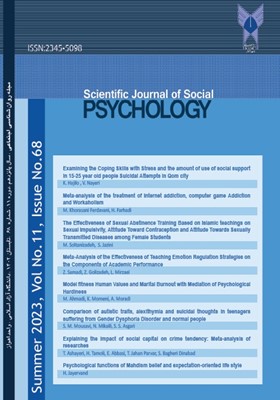Meta-analysis of the effectiveness of teaching emotion regulation strategies on the components of academic performance
Subject Areas : social psychology
Zahra Samadi
1
*
,
Zahra golizadeh
2
![]() ,
Leila Mirzaei
3
,
Leila Mirzaei
3
![]()
1 - educational psychology, Azarbaijan shahid madani university ,Tabriz, Iran
2 - educational psychology, Azarbaijan Shahid Mdani University, Tabiz, Iran
3 - educational psychology, Marvdasht Azad University, Marvdasht: Iran
Keywords: Self-efficacy, Academic Performance, motivational effects and planning, emotion regulation, emotional effects,
Abstract :
Academic performance is a multidimensional variable that is affected by several factors. One of the most important factors is emotion regulation strategies. The existence of numerous researches in this field makes it necessary to conduct a meta-analysis or research. The aim of the present meta-analysis is to reach a general conclusion and a correct judgment about the effectiveness of teaching emotion regulation strategies on the components of academic performance, including self-efficacy, emotional effects, motivational effects and planning (components of academic performance Pham and Taylor, 1999). This research determines the effect size of emotion regulation training by the meta-analysis technique and integrating the results of various researches. The target population is all the researches that have been conducted from 2001 to 2022 and have measured the effect of emotion regulation strategies on the academic performance of students with different indicators and are available in databases. After evaluating the studies based on the inclusion and exclusion criteria, 41 studies from 55 studies were selected and analyzed with CMA2 and SPSS software using Hedgesʹs g index and one-way analysis of variance. By performing sensitivity analysis in order to exclude studies with publication bias, 12 asymmetric effect sizes were removed from the total of 98 effect sizes obtained. the combined effect size values for the remaining 86 effect sizes in fixed and random models were calculated as 0/655 and 0/605, respectively that was meaningful. These results showed that teaching emotion regulation strategies is effective on the components of academic performance.According to Cohen's criteria, the amount of this effect size is moderate in all four components. And among these, the effect size related to self-efficacy has the highest value (0/684) and planning has the lowest value (0.386). Also, the results of the analysis of variance indicate a significant difference between the components. It seems that teaching emotion regulation strategies can be used as a suitable method to improve students' academic performance.
_||_

